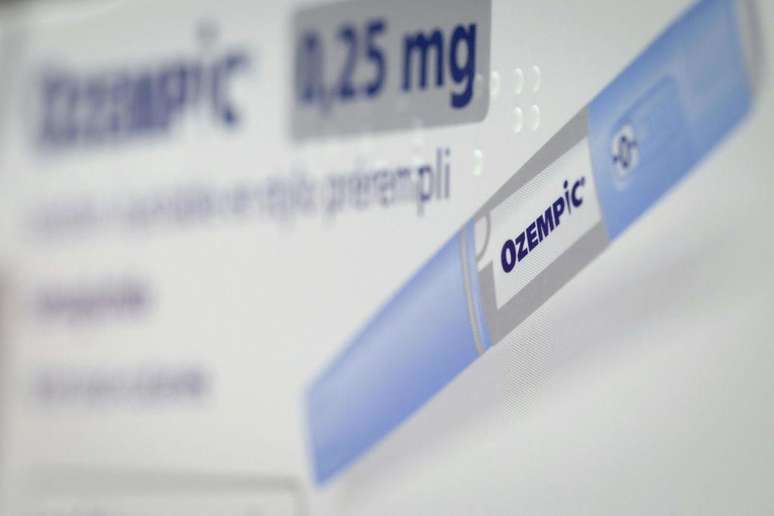Just type “Ozempic” in social media searches to find videos showing people saying they lost weight using the drug and giving their testimonials about it.
Seeking this result, publicist Fernanda Guimarães Pimenta, 29, decided to use the drug without medical advice and ended up in the ICU and almost had liver failure – when the liver stops working.
After watching these videos on social networks, Fernanda decided to use Ozempic, a “pen” with a needle at the end, without medical supervision in July last year. She also knew some friends who were using the medication and were losing weight quickly.
“I started to be impacted by the videos, I even joke saying that I was influenced by my own work since I am an advertising person. The algorithm started showing me several videos talking about using Ozempic and its positive results. So, I put it in my head that if I took it, it would work out super well too”, she reports.
At the time, the publicist was dissatisfied with her own body after gaining 10 kilos during the pandemic period and going from a 40 to a 44 mannequin. Working at home-office, she stopped walking to the office where she works, in São Caetano do Sul, increasing their sedentary lifestyle and contributing to weight gain.
In a note to BBC News Brazil, the laboratory Novo Nordisk, manufacturer of Ozempic explained that the drug is indicated for the treatment of adults with insufficiently controlled type 2 diabetes, as an adjunct to diet and physical exercise.
The manufacturer also adds that the drug should be used and marketed only under medical prescription, contraindicated for pregnant women, nursing mothers and patients allergic to semaglutide.
Regarding the complications experienced by Fernanda after using the drug without a prescription, the manufacturer explained that the drug does not interfere with liver function.
“It can be used in patients who have mild and moderate liver failure. Experience in patients with severe hepatic impairment is limited. But there is no increase in liver enzymes related to the use of the drug. However, the increase in pancreatic enzymes may occur transiently and patients with a previous history of pancreatitis should use the product with caution”, he said in a note.ADVERTISING
“Gastrointestinal disturbances, such as nausea, were the most frequently reported adverse events, most of which were transient, of mild intensity and did not lead to interruption of treatment. These events occurred in a similar proportion in relation to other GLP-1 analogues already commercialized in Brazil. Premature discontinuation of treatment due to adverse events was less than 10% in all studied groups1-7. It should be noted that treatment should always be guided by the recommendations provided by the treating physician and should be based on an individual assessment of the patient’s needs,” he added.
‘Anxiety and headache’
“I really insisted that my boyfriend buy the medicine for me. And as a way of trying to please me, he bought it at a pharmacy, without a prescription or any type of restriction, and paid R$850. the publicist.
Soon after purchasing the medication, Fernanda once again resorted to videos on social networks to learn how to apply the medication and decided that she would use Ozempic once a week, increasing the dose with each application.
“I applied the first injection. I started to feel a lot of anxiety and a headache, but until then I was within the symptoms expected by the medication and are predicted in the leaflet. The following week, I decided to increase the dosage on my own, going from 0.25 mg to 0.5 mg, thinking it would boost the results”, recalls the publicist.
After the second application, the symptoms became more intense and the publicist decided to seek medical help by going to the city’s emergency room. There were eight trips to the hospital to treat the symptoms that did not cease.
Embarrassed, the young woman did not report to the doctors that she was using Ozempic without professional supervision.
“I couldn’t stop throwing up, I felt a lot of pain in my stomach and I spent the day nauseous. I went eight times to the emergency room to take medication into a vein and nothing helped. I would come home and keep throwing up,” she recalls.
“I was embarrassed to tell the doctor that I was using it on my own, so I said that I was taking Ozempic, but that a doctor had recommended it”, he adds.

Fernanda is now recovered — she started bodybuilding and has already lost seven of the ten kilos she had gained during the pandemicPhoto: Personal Archive / BBC News Brasil
After blood tests, the doctors found that the publicist had changes in her liver and asked her to be hospitalized. Due to the seriousness of Fernanda’s health condition, she was referred to the ICU so that the doctors could closely monitor her liver enzymes, which, according to the publicist, were more than ten times above what is considered normal.
“I said I didn’t want to stay in the ICU and the doctor was very sincere and said “or I’ll hospitalize you to monitor your liver, or you can go to the transplant queue” because if the enzymes continued to rise, my organ would stop working”, reports the woman. advertising.
In addition to the liver problem, the publicist was also diagnosed with gallstones. Experts do not know if it was triggered by the use of Ozempic or if the young woman already had the problem and it was only potentiated by the drug.
There were seven days of hospitalization in the ICU, taking pain medication and controlling the liver. With the treatment, Fernanda’s liver enzymes reduced, indicating the recovery of the organ, ruling out the need for a transplant.
Recovered, the publicist started to do bodybuilding twice a week and has already eliminated seven of the ten kilos she had gained during the pandemic.
What is Ozempic and when is it nominated
Ozempic is the trade name of an injectable medication called Semaglutide, initially indicated to help in the treatment of type 2 diabetes.
Semaglutide helps control blood sugar by increasing insulin production and reducing glucose production by the liver. As it is a medicine, the dose and way to use it must be guided by a doctor.
“It helps control blood sugar, reduces appetite and delays gastric emptying, which means that food stays in the stomach longer, providing a feeling of satiety. Also, it can reduce body fat. In clinical studies, Semaglutide has been shown to improve insulin sensitivity and increase fat burning, which can help with weight loss. This is also an advantage in reducing liver fat, benefiting patients with hepatic steatosis with difficulty or poor response to changing habits with diet and exercise”, explains Carla Adriana Loureiro de Matos, hepatologist at the advanced medicine center at Hospital Sírio Libanês.

Ozempic packagingPhoto: JOEL SAGET/AFP via Getty Images / BBC News Brasil
Despite this, unlike what happens in Europe and the USA, Semaglutide is not yet released by Anvisa (National Health Surveillance Agency) for use solely against obesity in Brazil.
“Its use is recommended for adults with type 2 diabetes, as an aid in the treatment, together with diet and exercise. It can be used as a single medication, but it can also be used in combination with other medications if necessary. Ozempic has not yet been released for use in children and adolescents under 18 years of age and should not be used in pregnant women due to the lack of studies with this public”, adds Matos.
As with any medication, its indiscriminate use can have serious consequences, such as:
– Enhancement of diabetic ocular complications;
– Severe dehydration with kidney failure;
– Severe acute pancreatitis.
“Patients who are using Ozempic, if they need to undergo a surgical procedure, for example, need to discontinue use several days before or else fasting, which for surgery would be 8 hours, has to be 48 hours, because patients can aspirate the gastric contents at the time of intubation”, explains Rodrigo Surjan, a surgeon at Hospital Nove de Julho.
Why does it cause weight loss so fast?
One of the “side effects” of Semaglutide is rapid weight loss. This happens because Semaglutide, which is an agonist (which simulates the action) of a hormone called GLP-1, produced by the intestine and, in addition to contributing to glycemic control, also acts in the hypothalamus, reducing the desire to eat. And, as already shown in some studies, it also improves emotional hunger, which is that eating out of anxiety.
“Studies were done looking at the treatment of obesity with Ozempic and it was observed that higher doses would have a better effect on weight loss. With this study, a drug with the trade name Wegovy was approved in Brazil, which is not yet sold in pharmacies, but which will arrive soon. It has a higher dose of Semaglutide than you have in Ozempic, being more effective in the treatment of obesity”, explains Fábio Trujilho, director of the Obesity Department of the Brazilian Society of Endocrinology and Metabolism (SBEM).
Wegovy, the specific drug against obesity, also has Semaglutide as its active ingredient. It has already been approved by Anvisa and contains 2.4 mg (Ozempic has 1 mg).
“This drug can result in an average loss of 17% of body weight and can be used safely in people with or without diabetes. However, always with medical supervision who will make the correct dosage, since the slow and gradual increase in the dose greatly reduces the chance of side effects”, says Bruno Geloneze, a researcher at Unicamp and member of the scientific department at Abeso ( Brazilian Association for the Study of Obesity and Metabolic Syndrome).
However, approval does not mean that it can be used indiscriminately and by anyone who wants to lose weight.
One of the criteria for indicating medication in the treatment of obesity is a Body Mass Index (BMI) greater than 30 (BMI < 30 = grade 1 obesity), or in people who have a BMI greater than or equal to 27 and who have other comorbidities associated with obesity and weight loss may contribute to the overall improvement.
To calculate BMI, simply divide a person’s weight by their height squared. The number obtained from this mathematical operation fits into one of the following categories:
Less than 18.5 – underweight
Between 18.5 and 24.9 – normal weight
Between 25 and 29.9 – overweight
Between 30 and 34.9 – grade 1 obesity
Between 35 and 39.9 – grade 2 obesity
Over 40 – grade 3 obesity
“It turns out that we see a lot of people resorting to self-medication without following these criteria. Sometimes people with normal weight, who want to lose 2 or 3 kg, end up making inappropriate use of the medicine, since it does not have this indication”, says the director of SBEM.
Credits: Earth.






